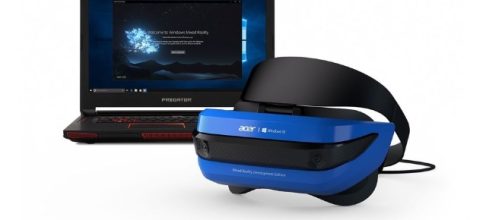Microsoft will begin shipping the Development Kits for their Windows Mixed Reality headsets later this month. Acer has produced the first device, which will also serve as the routine development edition for the new mixed reality platform. Microsoft made the announcement at the Game Developers Conference earlier this week, after which they treated attending developers to exclusive vouchers that would make them the first to receive the new units from Acer.
Microsoft enters Virtual Reality
So far, Microsoft has not ventured far into the world of virtual reality, choosing instead to focus on its AR product, the HoloLens.
The main rival of the Xbox One is Sony's PlayStation, which launched its own version of a VR headset last year. Sony reported having sold nearly 1 million units to date. Microsoft is likely expecting a better response to their latest offering, and the combination of virtual and augmented reality may just be what is going to give Windows Mixed Reality the edge.
At first glance, one might think that the devices made by HoloLens and Acer for Windows aren't that different, but there are in fact fundamental contrasts. The HoloLens visor is transparent, while the Acer VR headset will be opaque, allowing for a more panoramic view. With the Acer unit, you'll be able to see a fully virtual world, whereas with the HoloLens you are moving within your actual surroundings.
The Acer device has cameras on the front, as well as on the inside-out. This means that users won't need to purchase additional hardware like sensors in order to experience full six degrees-of-freedom tracking. The visor display panels boast a mighty resolution of 1440 x 1440 which can refresh at a rate of 90 hertz. In terms of accessories, the headset includes ports for HDMI 2.0, USB 3.0 and a 3.5mm jack for audio.
Ready for Christmas release?
An Acer kit will set you back about $299 when the time comes, but Microsoft is hoping to launch models from Asus, Dell, HP, 3DGlasses, and Lenovo by Black Friday this year.
Microsoft is up against companies like Facebook's Oculus and HTC who are also scrambling to gain a foothold in what promises to be a booming market.
Oculus has already suffered a setback after realizing that consumers weren't interested in paying the launch price of their product, and was forced to lower the price by $100 this week.
Microsoft hasn't indicated whether the Windows Mixed Reality kit will be compatible with the Xbox One or Scorpio, but the company's divisions are so intrinsically linked that it seems inevitable.

